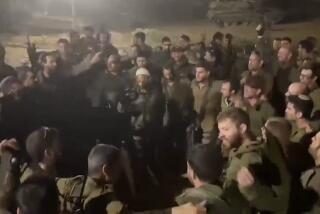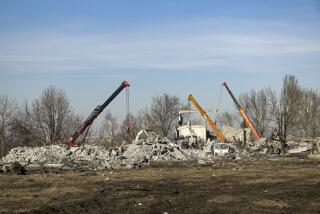WITH THE 1ST ARMORED DIVISION : Soldiers Furious Over Report of Trickery : Combat: ‘There ain’t going to be no next time,’ one says after word spreads that Iraqis faked a surrender to launch a sneak attack.
WITH U.S. FORCES, Saudi Arabia — It was one of those reports of battlefield trickery--perhaps apocryphal, perhaps accurate, it didn’t really matter--that left the troops deeply disturbed and depleted any reserves of empathy they might have held for the enemy.
In the initial attack on Khafji, a young lieutenant recounted to fellow officers in the operations center here, Iraqi tanks had turned their turrets backward in a false signal of surrender--stealing precious minutes to churn closer to the allied positions before opening fire: a sneak attack.
The dimly lit tent grew quiet. A fist was pounded in frustration.
“From now on, I say ‘screw it,’ ” one voice said slowly. “All those mothers die.”
“There ain’t,” said another, “going to be no next time.”
In a war that until now had carried little fury, the widely circulated press and military intelligence reports of an Iraqi sneak attack on U.S. forces down the line--unconfirmed in official briefings--ignited an explosion of outrage and a grim recognition that battle would not be fought according to American rules.
“There is a lot of anger out there,” Army Chaplain Bill Trudgeon said after moving Thursday morning from camp to camp, as Iraqi forces still held the border town of Khafji.
“The soldiers feel cheated,” said the chaplain, a 41-year-old Methodist from Kitanning, Pa. “They think we could have won hands down if it had been a fair fight.”
Even before the Iraqi raid, the constant threat of chemical attack had set soldiers to shouting oaths at Iraqi President Saddam Hussein. The deliberate release of Kuwaiti oil into the Gulf and the announcement from Baghdad that downed allied pilots would be deployed as strategic shields had added to an almost universal sense among ground troops that the Iraqi leader is truly evil.
Yet, American troops still had spoken of battle as a job, not a crusade, and seemed to carry little hostility toward soldiers on the other side of the lines. On Thursday, with the ground battle suddenly joined in what soldiers and officers in a dusty camp here disparaged as the most cunning of ways, the war seemed suddenly less a business than a deeply personal fight.
“Now, you never know if they’re going to surrender or if they’ve got something up their sleeves,” said Sgt. James Fletch, a 26-year-old antiaircraft gunner from Tifton, Ga. Already, the heat-seeking Chapparral missiles on his rig bore new inscriptions, one of them simply labeled: “Up Yours.”
“They’re a bunch of sorry bastards,” said Spec. Leo Zamora, a 21-year-old infantryman from Corpus Christi, Tex.
“I can’t imagine we ever liked the other side,” said Maj. Paul Whittaker, commander of Charlie Company, 26th Field Support Battalion, “but this definitely makes them a lot less likable.”
Among the more experienced of U.S. officers, there were hints of a grudging admiration for the alleged Iraqi tactic, in which advancing tanks apparently adopted a surrender-signal that had been set forth in leaflets air-dropped by the United States over Iraqi troop concentrations.
“It was a gutsy move,” said Maj. Roy Adams, the operations officer for the 3rd Brigade, 3rd Infantry Division. “It shows that his command and control is still somewhat intact.”
Officers said the Iraqi move had forced hasty revisions in the American leaflet-dropping campaign. Instructions to Iraqi troops immediately were revised: Surrendering soldiers were instructed not only to turn tank turrets backward, but also to walk ahead of their vehicle.
But across the ranks Thursday, soldiers made clear that they regarded prospects for a workable Iraqi surrender program as virtually doomed.
More to Read
Sign up for Essential California
The most important California stories and recommendations in your inbox every morning.
You may occasionally receive promotional content from the Los Angeles Times.










